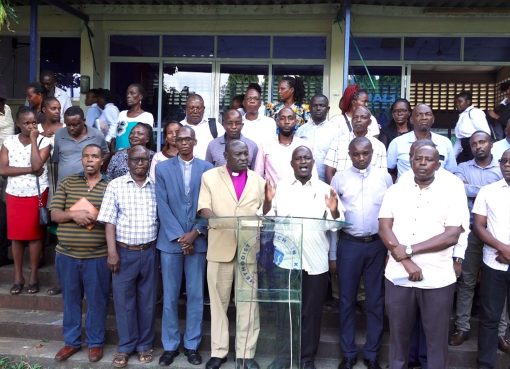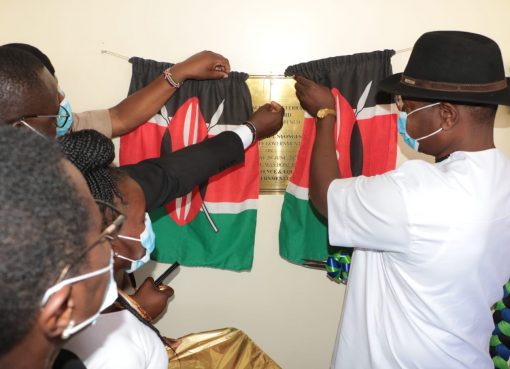The on and off skirmishes experienced in parts of Narok County has not only affected security in the county but also derailed development in the area.
Two weeks ago, fresh clashes that erupted in Olposimoru ward in Narok North Sub County led to the killing of six people and left scores nursing injuries as confirmed by the Narok County Commissioner Samuel Kimiti.
Several houses were torched and hundreds of acres of food crops destroyed during a week of skirmishes that involved the Kipsigis and Maasai Communities.
When such conflicts occur, women and children are the most vulnerable as they are left behind in insecure homes while the men go to the battlefield.
This is the reason why women drawn from Olposimoru area decided to hold a protest to push the government to ensure security is restored in the area as well as maintain peace in the volatile land.
“We as women have suffered since the year 2007 when violent conflicts started in this place yet we do not know the exact cause of the violence. We are determined to unite and we want the government to help us,” said Jeniffer Kotikoi, a woman leader in the area.
Ms Kotikoi lamented that despite the area being very productive bordering the Maasai Mau forest, the residents do not benefit from their farming investments because of the recurring intercommunal conflicts.
“We produce a lot of food crops like potatoes, maize and peas that are consumed in the neigbouring counties, but most of the time we incur total losses when the crops are destroyed in the shamba because of war,” she said.
She lamented that women suffer most during clashes adding that even after hiding in their houses the aggressors usually flush them out and torch the houses as they watch.
“Imagine watching your house being set ablaze in the presence of your children. This retards us behind because no matter how hard you try to prosper, someone brings you down in a matter of hours,” decried Ms Kotikoi.
At the same time, the women lamented the impassable roads that make them use long routes to access markets and government institutions.
“We have to trek for several kilometers before getting to a point where you can board a matatu. This becomes more complicated when transporting food produce from the shamba to market,” added Ms Kotikoi.
According to the women, impassable roads have also contributed to the many deaths during the fighting period as the injured cannot be rushed to the hospitals.
“Many people have died while on the way to the hospital as the roads are completely impassable,” adding that most women are forced to give birth at home because accessing the hospital is almost impossible,” she continued.
Ms Esther Saineng, wondered why the local leaders did not bother visiting the area to offer them a lasting solution on the crisis they are facing despite having voted them in office.
“During campaigns, we see our local leaders begging us to elect them and promising us heaven on earth, but immediately after they enter office, they do nothing to help us live a decent life,” said Saineng.
Ms Felister Masikonde blamed the county government for lack of a hospital in the area despite being promised a decent hospital during the campaigns.
“The people living on this land are extremely hard working and the area is one of the most productive lands in Narok county, if only our local leaders can help us boost our infrastructure, then this will be a land of honey and milk,” Ms Masikonde said.
Another resident Ms Nashipae Maleto said many families in the area produce gallons of liters of milk but do not get value for their produce because of the impassable roads.
“We have formed groups as women of Olposimoru where we buy dairy cows for one another. The groups also hire land where they plant potatoes, carrots or peas which they sell and divide the profits; however, we are suffering much because we cannot access the markets,” she said.
Ms Maleto decried the fact that brokers take advantage of the vulnerable women to buy their products at a very cheap price, which do not benefit the women groups.
“Sometimes we are forced to sell our potatoes at Sh500 a bag to brokers so that they cannot rot in the shamba. The middle men later sell four times higher making very huge profits,” she reiterated.
Narok County Commissioner Kimiti who visited the embattled land last week said a contingent of security officers drawn from the General Service Unit (GSU), Rapid Deployment Unit (RDU), Regular Police and the Kenya Forest Rangers had been sent to the area to calm the situation.
In the year 2018, the state imposed a 6am to 6pm curfew on Olposimoru residents after prolonged clashes that left six people dead in violence that was ignited by theft of 44 head of cattle .
The government deployed a contingent of security officers on the ground to ensure the curfew was implemented until calm was restored.
By Ann Salaton




